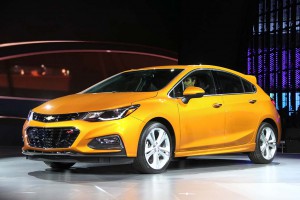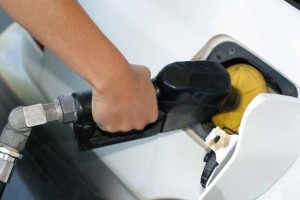
There'll be more battery-cars on the road in the years ahead, but not enough to bring oil prices crashing down, says Navigant.
Oil prices have tumbled sharply over the last year, and a variety of factors have led to the slide, including a weakening Chinese economy, as well as a reduction in demand among American motorists.
But battery-cars have had an almost negligible impact, and likely won’t have much of an impact going forward, despite some claims they’ve brought the oil market crashing to its knees. Far more credit goes to the rapid improvement in overall automotive fuel economy, suggests a new study by Navigant Research.
Such claims are “sensationalist,” says a report by the technology research firm, which adds that a much more substantial factor likely to hold down oil prices is “not a particularly sexy conversation topic.” But the reality is that fleet-wide fuel economy is expected to increase 22% over the next decade, says Navigant, reducing demand by millions of barrels of oil a day.
Between January 2011 and December 2014, the report estimates, battery-cars saved about 2.1 million barrels of oil. The existing automotive fleet could have saved just as much by reducing fuel consumption by just a tenth of one percent, according to Navigant.
The report came in response to a story that was run by the Bloomberg news service in February titled, “Here’s How Electric Cars Will Cause the Next Oil Crisis.” That article contended that in the years ahead, EVs will rapidly increase in number and eventually reduce U.S. oil demand by 2 million barrels a day.
That’s no small number, but Navigant’s response indicated that the Bloomberg piece “misses the bigger picture on energy and transportation,” and actually counters the news service’s own forecast.
The research firm says a variety of factors will reduce oil demand in the transportation sector. That includes the 54.5 mpg fuel economy Corporate Average Fuel Economy standard set by the EPA. But Navigant cites other influences, including the arrival of autonomous vehicle technology.
“The theory is that if enough vehicles have these systems, there will be fewer accidents, which leads to less congestion on roadways, which in turn has the benefit of increasing the efficiency of all vehicles on the road, both autonomous and non-autonomous,” wrote researcher Scott Shepard.
That argument was lent support by a new Carnegie Mellon study suggesting autonomous vehicles alone will cut fuel consumption by 10%.
(Click Here for more on that study.)
One of the big questions that neither Bloomberg nor Navigant could accurately address is the number of battery-based vehicle that will go into use on American roads by 2025. Ironically, as fuel prices have fallen over the past year demand for hybrids, plug-ins and pure battery-electric vehicles, or BEVs, has fallen sharply.
But facing the 2025 CAFE standard, most manufacturers have accepted the idea they will need to adopt at least some form of electrification. General Motors, for example, is rolling out the 200-mile Chevrolet Bolt BEV later this year. Daimler AG plans to have 10 plug-in hybrids in its line-up by the end of 2017. And both Volkswagen and its sibling Audi brands are expecting battery-based models to account for a quarter of their sales within the decade.
(From “powertrain” to “propulsion,” Click Here to see how GM is reinventing itself.)
But few expect diesel and gasoline-powered products to go away, and with the use of turbocharging, direct injection, next-generation transmissions and other mechanical improvements, those otherwise conventional powertrains are expected to continue yielding big improvements in mileage.
Oil prices have actually staged a modest rebound in recent weeks, crude oil surging by as much as 50% since mid-February, while gasoline prices around the U.S. have risen nearly 20%, to $2.041 for a gallon of self-serve regular unleaded as of Tuesday morning. But that’s still 38 cents lower than a year ago, and several energy sector studies are forecasting crude – and, thus, pump prices – will tumble again in the coming months.
(Gas prices surge as annual warm weather driving season gets underway. Click Here for more.)


I don’t think anyone is blaming electric vehicles or better fuel economy on rock-bottom oil prices. It is clear that it is because a U.S. glut of fuel extracted via fracking and no diminishing of pumping, the refusal of Saudi Arabia to limit pumping fearing losing market share, the resulting overstock of oil, and the broken manufacturing segment in China — traditionally the biggest user of oil.
It has nothing to do with EV. We only wish it did, because that would be an indicator of a shifting mindset within the U.S. consumer base. However, larger, gas-guzzling vehicles remain the standard-bearer for sales. EV manufacturers only could wish they could say they were having such a deleterious effect.
I will say however, as bait to attempt to stay current in the news cycle, refusing to take the blame for a “sin” no one in the world is actually blaming them of, is kind of brilliant and kind of irrational at the same time. I don’t know whether to cheer or to fear for their safety.
I think you are correct in that between the continued pumping of oil and mainly, China manufacturing’s engine has stalled and sputtered there’s a resultant glut of oil on the market and in reserve.
Try as they must, you can’t make oil trade higher. And even with the normal excuses, i.e. spring break, warm weather, switching between winter / summer blends, refinery “issues” the local stations have for the most part stayed in line. People have caught on and are becoming too well-informed to buy those excuses. Funny how that works.